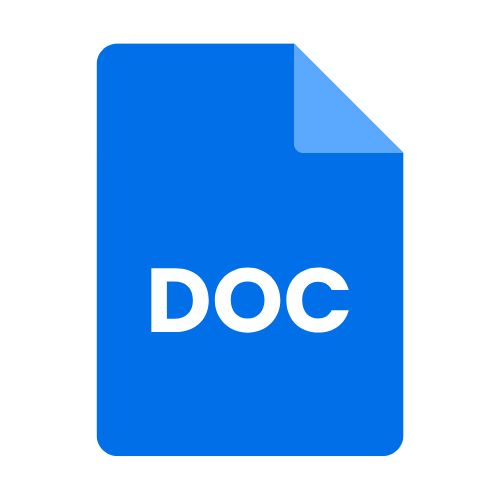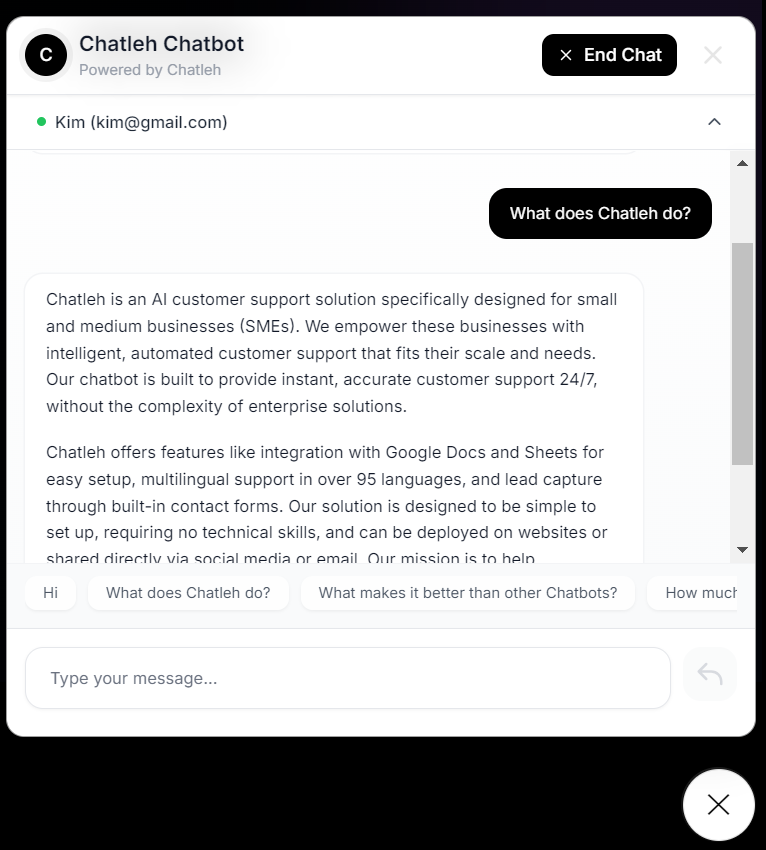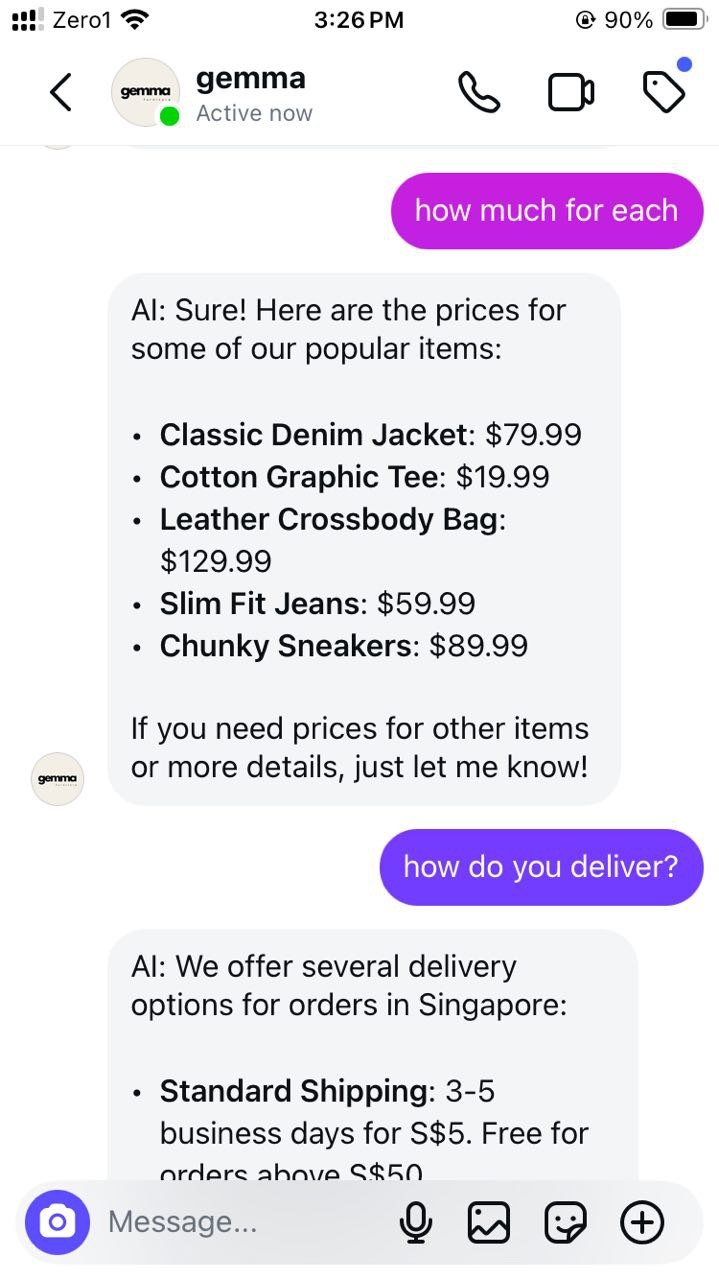AI Customer Support Chat Bot for Businesses
Transform your business communication with AI-powered chatbots that handle customer inquiries, act as a contact form, and integrate with your existing business tools.
AI Customer Support Chat Bot for Businesses
I was sitting with a client last week – the owner of a growing consulting firm – when his phone buzzed for what seemed like the hundredth time that hour. He glanced at it, sighed, and tucked it back into his pocket. "Another question about our pricing structure," he explained. "Same question I've answered twenty times this week."
This scenario plays out in businesses everywhere: talented professionals spending hours answering the same basic questions instead of doing the high-value work they're actually trained for. But it doesn't have to be this way.
The truth is, most businesses are facing a communication crisis. As customer expectations for instant responses grow, the resources needed to meet those expectations are becoming unsustainable. People want answers at 10 PM on a Sunday. They expect immediate responses to emails and Instagram messages. And they'll quickly move on to a competitor if they don't get what they need.
What makes this particularly challenging is that roughly 80% of these inquiries are predictable and repetitive. The same questions about business hours, pricing, availability, and basic processes come up again and again. It's the perfect scenario for automation, but until recently, the technology wasn't sophisticated enough to handle these conversations in a way that felt natural and helpful.
That's where AI-powered solutions like Chatleh are changing the game. These aren't your clunky, frustrating chatbots of yesteryear. Modern AI assistants can understand context, handle complex inquiries, and provide responses that feel genuinely helpful. They're transforming how businesses communicate with customers across multiple channels.
When I first started exploring this technology with clients, the skepticism was palpable. "AI can't replace human connection," they'd say. And they're right – it can't and shouldn't. What it can do is handle the routine inquiries that consume your team's time, freeing them to focus on the complex, nuanced interactions where human empathy and expertise truly matter.
Let me share what happened when a small e-commerce client implemented Chatleh on their website and Instagram. Before the AI assistant, their two-person team was drowning in messages across multiple platforms. Their average response time was 7 hours – an eternity in e-commerce. Within a week of implementation, not only were customers receiving instant responses at all hours, but sales conversions jumped by 32%. The most surprising insight? Almost 40% of their sales now happen outside normal business hours – transactions they would have completely missed before.
What makes these AI solutions particularly powerful is their ability to integrate with your existing business knowledge. Most businesses already document their processes, products, and policies somewhere – typically in Google Docs, Google Sheets, or on their website itself. Instead of creating a separate knowledge base for your AI assistant, platforms like Chatleh can connect directly to these existing resources.
Think about that for a moment: your customer service documentation already exists. Your product details are already carefully crafted. Your pricing is already organized in spreadsheets. Why recreate all of this for a chatbot? Chatleh simply taps into these existing resources, ensuring your AI assistant always has the most up-to-date information without requiring additional maintenance.
The Google Docs integration is particularly powerful for businesses with complex products or services. One law firm I worked with connected their AI assistant to their extensive documentation on different practice areas. Now, when potential clients visit their website after hours, the AI can explain their approach to family law, business formation, or estate planning – drawing directly from the firm's own carefully written materials. The information is accurate and consistent with their expertise because it comes directly from their own documentation. Learn more about Google Docs integration

For businesses with structured data – product catalogs, pricing tiers, service options – the Google Sheets integration offers incredible flexibility. A boutique furniture retailer connected their inventory spreadsheet to their chatbot, allowing it to answer specific questions about dimensions, materials, availability, and pricing. When they update prices or inventory in their master spreadsheet, the AI automatically has the latest information without any additional work. Explore Google Sheets integration

Website scraping takes this integration a step further. If your business already maintains comprehensive information on your website, Chatleh can automatically extract and learn from that content. This creates a powerful virtuous cycle: the effort you put into creating helpful website content directly improves your AI assistant's capabilities. See how website scraping works
What about integration with your website? The implementation is surprisingly simple. Most clients opt for a floating chat widget – that small bubble in the corner of your site that expands when clicked. It's unobtrusive but readily available when customers need help. For businesses that want a more prominent solution, embedded chat interfaces can be placed directly on key pages like product listings or contact sections. View chat widget options | Learn about page embedding

Some businesses worry about sending customers to another platform. That's where direct links come in – shareable URLs that open a dedicated chat interface wherever they're accessed. A financial advisor I work with includes these links in his email signature and social media profiles, allowing prospects to immediately ask questions about his services without navigating to his website first. Discover direct sharing
The Instagram integration might be the most transformative feature for businesses active on social media. Instagram has evolved from a photo-sharing app into a critical sales channel, with direct messages becoming a primary touchpoint for customer inquiries. The challenge is that these DMs require constant attention, arriving at all hours and often containing the same basic questions. Learn about Instagram integration
By connecting Chatleh to your Instagram business account, those messages receive immediate, accurate responses directly from your knowledge base. A jewelry designer who implemented this was initially skeptical – "My products are unique and personal, can AI really represent them properly?" She connected her product catalog via Google Sheets and her policies via Google Docs to find out.

The results surprised her. Not only were customers getting accurate information about materials, sizing, and shipping, but the conversations felt natural enough that many customers didn't realize they were speaking with an AI. The most significant impact was on her international sales – with the AI handling inquiries 24/7, customers in different time zones no longer had to wait overnight for responses. Her international orders increased by 45% within two months.
What impressed me most about her experience wasn't just the sales increase, but how it changed her relationship with her business. "I used to dread looking at my phone in the morning," she told me. "Now I actually enjoy Instagram again because I'm engaging with interested customers about creative aspects of my work, not answering the same shipping questions over and over."
This is the real promise of AI customer support – not just efficiency, but transformation in how business owners and their teams spend their time. When the routine, predictable interactions are handled automatically, you can focus on the areas where human connection truly matters.
The traditional contact form is perhaps the clearest example of an outdated approach that AI is replacing. Think about the typical website experience: a visitor has a question, navigates to your contact page, fills out a form, and then... waits. Maybe they get an answer in a few hours. Maybe a few days. Maybe never. That visitor wanted information to move forward with you, but instead hit a dead end.
Now imagine a different scenario: that same visitor has a question and immediately engages with an AI assistant that can provide accurate answers based on your business knowledge. If their question is among the 80% that are routine and predictable, they get an immediate answer and can continue their journey with you. If they have a complex inquiry that truly needs human attention, the AI can collect their information and set proper expectations about a response. Everyone wins – the visitor gets either an immediate answer or clear expectations, and your team focuses their time on high-value interactions.
A consulting firm I worked with saw this transformation firsthand. Before implementing Chatleh, they received about 35 form submissions per week, each requiring staff time to review and respond. After adding the AI assistant to their site, form submissions dropped by 72% – not because people were less interested, but because visitors were getting their questions answered immediately through the chat interface. When form submissions did come through, they were higher quality leads who had already had preliminary questions answered by the AI.
The insights these businesses gain from their AI interactions have proven surprisingly valuable as well. The analytics dashboard shows exactly what customers are asking about, what information they're seeking most frequently, and where they tend to get stuck. A marketing agency discovered through their chat analytics that potential clients were frequently asking about pricing for specific services that weren't clearly outlined on their website. This led them to create a new pricing page that addressed these common questions, improving both their website conversion rate and their AI assistant's effectiveness. Explore chat analytics
What about getting started? The process is remarkably straightforward:
First, identify what information your customers frequently need. For most businesses, this includes details about products or services, pricing, processes, policies, and availability.
Next, ensure this information exists in accessible formats – Google Docs, Google Sheets, or on your website. If you're missing documentation in some areas, this is a good opportunity to create it (which benefits your business operations beyond just the AI implementation). Learn about data input options
Then, connect these knowledge sources to your Chatleh account and customize how your AI assistant communicates. You can adjust the tone, add guided conversation prompts, and set parameters for when to collect contact information.
Finally, deploy your assistant through your preferred channels – website widgets, embedded interfaces, direct links, and Instagram integration if applicable.
The entire setup process typically takes just a few hours, and you'll start seeing results immediately. Most businesses report that their AI assistants effectively handle 70-80% of routine inquiries within the first week, with effectiveness improving over time as the system learns from interactions.
A question I often hear is: "Will this feel impersonal to my customers?" It's a reasonable concern. Many of us have had frustrating experiences with primitive chatbots that can't understand basic questions or get stuck in loops. Modern AI assistants like Chatleh are fundamentally different – they understand context, learn from conversations, and can handle complex language in a way that feels natural.
More importantly, they're drawing from your specific business knowledge, not generic responses. When a customer asks about your return policy, they're getting the exact information from your documentation, not a vague answer that might apply to any business. This specificity creates an experience that feels surprisingly personal.
I've been tracking customer feedback across several Chatleh implementations, and the response has been overwhelmingly positive. Customers appreciate getting immediate, accurate answers when they need them. Many don't even realize they're interacting with an AI until it's mentioned. And when the AI does need to hand off to a human for complex issues, customers arrive at that interaction better informed and with clearer expectations.
For business owners and their teams, the impact goes beyond operational efficiency. It changes how they experience their work. When you're not constantly interrupted by routine questions, you can focus on meaningful projects, complex problem-solving, and developing deeper customer relationships. Many report feeling more energized and creative, with greater job satisfaction as they engage with the aspects of their work that truly require their unique skills.
As we look toward the future of business communication, the integration of AI assistants seems inevitable. Customer expectations for immediate, accurate responses aren't going to decrease. The businesses that thrive will be those that can meet these expectations efficiently while still providing genuine human connection where it matters most.
This isn't about replacing human interaction – it's about enhancing it. Your AI assistant handles the routine, repetitive inquiries that previously consumed your team's time and energy. Your people focus on building relationships, solving complex problems, and creating exceptional experiences. Together, they deliver a level of service that wouldn't be possible with either alone.
If you're curious about how this might work for your specific business, I'd encourage you to explore the possibilities. The best way to understand the impact is to experience it firsthand. Many businesses start with a simple implementation on their website, measuring the results before expanding to additional channels like Instagram.
The right AI customer support solution should feel like adding a knowledgeable team member who works 24/7, never gets tired, and always has the right information at their fingertips. If that sounds valuable for your business, it might be time to explore what's possible.
Ready to improve your customer support experience? Get started with Chatleh today and discover how AI can enhance your business communication while freeing your team to focus on what they do best.